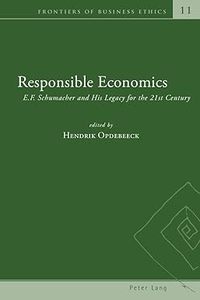Por favor, use este identificador para citar o enlazar este ítem:
https://repositorio.uca.edu.ar/handle/123456789/19325| Título: | The call for responsibility and the crisis | Autor: | Hoevel, Carlos | Palabras clave: | CRISIS FINANCIERA; RESPONSABILIDAD; CONOCIMIENTO ECONOMICO; CREDITO; INDICADORES ECONOMICOS; INCENTIVOS MONETARIOS | Fecha de publicación: | 2013 | Editorial: | Peter Lang | Resumen: | During the last decades many mainstream economists have considered I he relative success of globalization to be a general refutation of almost each of Schumacher's warnings and forecasts about the evil consequences of a lack of adequateness of the economy to the qualitative natural, ethical and spiritual limits of man and society. In the first place, these authors argued that the last three decades of accelerated economic growth had not been the product of qualitative and 'adequate' policies but of standardized drregulation policies based on neoclassical 'value free' models that had comitted an indefinite expansion of financial markets and technological innovations. In the second place, these same authors generally also argued that the economic success had been the result of the generalized introduction of monetary incentives and increasing flexibility in the labour without needing to take into account any other factors, based on the neoclassical assumption that in order to behave rationally people need only extrinsic motivations. In the third place, the same authors believed that consumerism and a massive use of credit was no longer as serious risk as it had been in the past because the new forms of global financing permitted a sufficient access to money and therefore to consumption in an almost limitless amount. Finally, most of the supporters of this position were very optimistic about the future, based mainly on the assumption that the available economic indicators and indexes were on the whole satisfctory and correct. In opposition to these four statements I will argue in this paper that, especially after the financial crisis, there are very concrete reasons to believ that these arguments were false and that, as a consequence, and from now on, we should go exactly in the opposite direction. In that sense, I will try to present briefly, on the one hand, some arguments proposed by contemporary economists and business theorists who differ with the opinions of orthodox mainstream representatives about the nature and meaning of these four crucial issues of the last crisis: the use of economic knowledge, the role of monetary incentives, the expansion of credit and the reliability of standard economic indicators and indexes. On the other hand, I will try to connect these arguments with some of E.F. Schumacher's insight, into the concept of 'adequateness' - explained by him in his A Guide for the Perplexed and applied to many issues in his Small is Beautiful and Good Work - but adapted to the new context of our post-crisis economy. Finally, I will attempt to propose an ethical agenda of new responsibilities chat flow from the four above-mentioned issues, taking into account Schumacher's call to adequate our extremely powerful and risky economic tools to the natural limits of the human being and the planet. | URI: | https://repositorio.uca.edu.ar/handle/123456789/19325 | ISBN: | 9783034317078 | Derechos: | Atribución-NoComercial-CompartirIgual 4.0 Internacional | Fuente: | Opdebeeck, H. (2013). Responsible Economics. E. F. Schumacher and his Legacy for the 21st Century. |
| Aparece en las colecciones: | Libros/partes de libro |
Ficheros en este ítem:
| Fichero | Descripción | Tamaño | Formato | Login |
|---|---|---|---|---|
| call-responsibility-crisis.pdf | 2,85 MB | Adobe PDF | SOLICITAR ACCESO | |
| call-responsibility-crisis.jpg | 8,56 kB | JPEG |  Visualizar/Abrir |
Este ítem está sujeto a una Licencia Creative Commons

